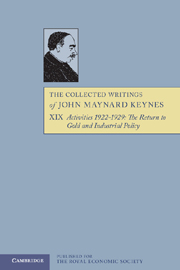Book contents
- Frontmatter
- Contents
- General introduction
- Editorial note
- PART I
- 1 FINANCE AND INVESTMENT 1922–1923
- 2 POPULATION, PROTECTION AND UNEMPLOYMENT
- 3 MONETARY REFORM AND UNEMPLOYMENT
- 4 THE RETURN TO GOLD AND FOREIGN LENDING
- 5 THE ECONOMIC CONSEQUENCES OF MR CHURCHILL
- PART II
- Appendix
- List of Documents Reproduced
- Index
5 - THE ECONOMIC CONSEQUENCES OF MR CHURCHILL
from PART I
Published online by Cambridge University Press: 05 November 2012
- Frontmatter
- Contents
- General introduction
- Editorial note
- PART I
- 1 FINANCE AND INVESTMENT 1922–1923
- 2 POPULATION, PROTECTION AND UNEMPLOYMENT
- 3 MONETARY REFORM AND UNEMPLOYMENT
- 4 THE RETURN TO GOLD AND FOREIGN LENDING
- 5 THE ECONOMIC CONSEQUENCES OF MR CHURCHILL
- PART II
- Appendix
- List of Documents Reproduced
- Index
Summary
With the announcement by the Chancellor of the Exchequer in the House of Commons on 28 April of Britain's return to gold, Keynes's campaign against the gold standard naturally took a new tack. His first comment, which appeared in The Nation of 2 May, contained a mistake which he corrected in the next issue.
From The Nation and Athenaeum, 2 May 1925
THE GOLD STANDARD
Mr Churchill has done what was expected, and the experience of a hundred years ago has repeated itself. With one improvement;—Ricardo's Ingot Plan, rejected then, has been adopted now, and the public are not to have back their sovereigns.
But there is also another improvement,—one of no immediate significance, but perhaps of great importance to the ultimate evolution of our currency. The free mintage of gold has been suspended, and the right to tender gold bullion for conversion by the Mint into legal tender will belong, in future, to the Bank of England only. The Bank of England will be compelled by law to give gold bullion (in bulk) for its notes at the fixed price of £3 17s. 10½d. per oz. standard; it will not be compelled to give notes for gold bullion at a fixed price. Thus our legal tender can never be worth less than its gold parity; but it may, conceivably, be worth more. This wise provision protects us against two contingencies.
- Type
- Chapter
- Information
- The Collected Writings of John Maynard Keynes , pp. 357 - 454Publisher: Royal Economic SocietyPrint publication year: 1978
- 1
- Cited by



